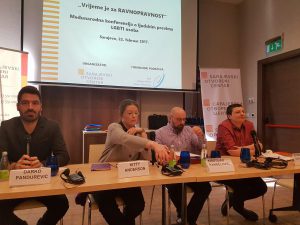International conference It is Time for EQUALITY: Intersex people – Legal Overcoming of the Gender Binary, 22nd February 2017
 Written by: Nera Mešinović
Written by: Nera Mešinović
Panel discussion that closed the conference It is Time for EQUALITY was named Intersex Persons – Legal Overcoming of the Gender Binary. The panelists were Darko Pandurević (Sarajevo Open Centre), Kristijan Ranđelović (Gayten, Serbia) and Kitty Andersen (OII Europe!). Slobodanka Boba Dekić was a moderator of the panel.
In the opening statements, Boba Dekić defined the term intersexuality as an umbrella term for 30 to 40 different medical conditions and emphasized the fact that there are no intersex persons in B&H or in the region that are willing to talk publicly about this topic.
Darko Pandurević, the author of publication Bodies That Overcome Binarity, talked about the medical practices towards intersex persons in several aspects. First, the unwillingness of medical institutions to cooperate. He presented the survey that he conducted with hospitals throughout the B&H. Only 8 out of 28 hospitals replied to the inquiry. 4 medical institutions confirmed that they had come across cases of intersex persons. He aimed in his publication to confirm the existence of intersex cases in B&H and that they are not as rare as previously considered. Also, he tried to find out if the sex normalizing procedures are carried out on newborns in hospitals and if the parents of a newborn give their informed consent to the procedures. Darko also covered the process of registering and assigning sex to a newborn. In his conclusion, he states that to correctly treat this problem, interdisciplinary approach to parents and children is required that would include medical as well as psychological information and counseling. In B&H a third gender marker does not exist, and newborns are assigned either male or female sex. Darko states that the recommendations of experts are to avoid any sex assignment treatment until the moment when intersex persons are able to give their informed consent and express their own will.
Kristijan Ranđelović has worked for five years in the area of human rights of intersex people. He talked about medical clinic in Belgrade that conducts sex normalizing procedures for more than 15 years. He emphasizes the fact that this practice is unacceptable towards intersex people and how degrading and harmful it is. The clinic still uses inadequate terms such as hermaphroditism. It also insists on invasive sex normalizing surgeries. Kristijan talked about the problem that a lot of intersex persons finds out in their puberty about genital surgeries conducted on them while they were newborns. Those kinds of procedures violate their rights as a child, their body integrity and autonomy. Intersex persons and experts demand that those kinds of procedures should stop immediately.
Kitty Andersen gave the overview of the movement for the human rights of intersex people and stated that the movement is in its beginning. She gave comparison with LGB and Trans* rights movements, saying that, if the LGB movement has achieved its maturity, T* movement is in its teen years, then, intersex movement can be considered to be in its infancy. Over 60% of parents consult only medical experts while making decisions about their newborns which provides one sided and incomplete information, she said. Doctor’s approach usually consists of saying to the parents what is wrong with their newborn and the options that can correct that. Parents choose surgical interventions because they are not able to understand complicated medical terminology and consequences of those decisions for their child, states Kitty. She also talked about the problems of inquiring about intersex cases in EU, while the procedures of treating intersex persons and their parents differs from hospital to hospital.
Experts agree that the reasoning for medical interventions are almost exclusively of social nature: to improve process of bonding parents with their child, to strengthen the established binary division of gender identities, to avoid stigmatization, etc. Governments should approach this problem with care and attention and that the time for waiting is over because intersex persons suffer each passing day because governing bodies and decision makers are not addressing this problem, states Kitty. Some of the consequences of those mistreatments of intersex people are loss of reproductive functions, ability to produce hormones, osteoporosis, fibromyalgia, chronic pain and lack of energy. Genital interventions lead to chronic pain, insensitivity of reproductive organs, scar tissue, etc.
Kitty concludes that if medical practitioners would wait with the interventions until the person can give their informed consent, body integrity of a child would not be violated and surgical procedures in general would not carry so much consequences with them. She also states that there is not a single medical reason for sex normalizing procedures to intersex people to be considered a general practice and that even if some medical interventions are medical necessity, they should be considered and conducted just as with any other person.
human rightsintersexintersex personsLGBTI conferencesoc